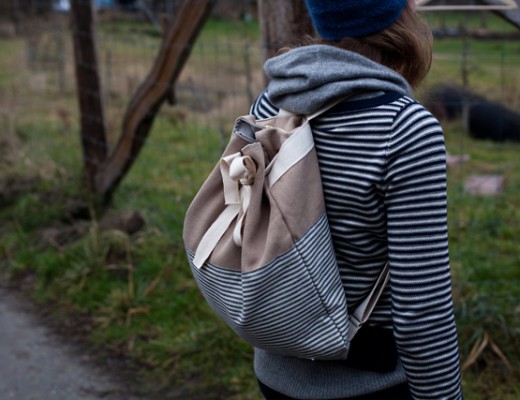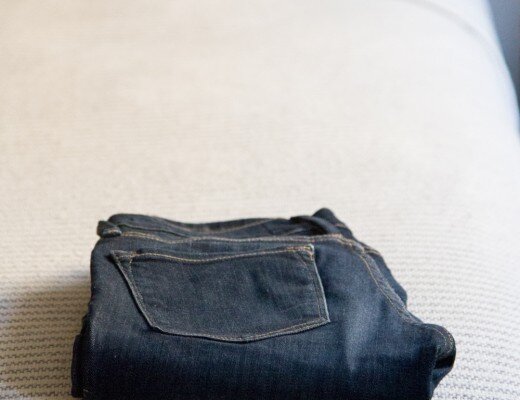
For the past four years, I’ve spent a good deal of time thinking about the clothes that I wear. In the Growing a Minimalist Wardrobe series on my blog, and in my book, Simple Matters, I’ve encouraged readers to interrogate their relationship to clothes alongside me. How do they make us feel? How do we wear them? Who’s making them? And what’s the impact on people and the planet? In the course of that work, I’ve had the privilege and honor of working with small designers to spread the word about their efforts in the slow, sustainable, and ethical fashion communities. But in my call for conscious consumption, there has been plenty that I’ve overlooked. This year, I’m hoping to hand this platform over to some of the folks who are currently instrumental in expanding, enriching, and diversifying the conversations happening in the slow fashion community.
This week, I invited Emi Ito, founder of the #BuyFromBIPOC Instagram challenge to write about why she’s spending the next year buying from Black, Indigenous, and other people of color (BIPOC) designers and BIPOC-owned and operated businesses. In addition to her personal shopping challenge, Emi created and is co-moderating the newly launched @BuyFromBIPOC Instagram account. The account will serve as meeting space and megaphone for sharing the work of BIPOC creatives in the slow fashion community, from designers, to business owners, to influencers.

Here’s more from Emi:
Slow and ethical fashion became a part of my life more than three years ago when I was pregnant and began the work of deeply reflecting on my core values and aligning more fully with who I want to be for my child. I realized that my love of fashion could merge with my commitment to be more sustainable in all facets of my life. But as I began to follow more slow fashion brands and influencers, a common theme emerged: The familiar, uncomfortable sensation of being an outsider in a white dominated space. Time and time again, I saw white influencers and white-owned slow fashion brands being centered and promoted in ways that were not consistent with what I saw happening for their Black, Indigenous, and other people of color counterparts.
The oppression of white supremacy meant that despite their significant contributions to creative work in these fashion spaces, BIPOC-owned slow fashion brands and BIPOC makers and influencers like Dominique Drakeford of Melanin and Sustainable Style, Deb Shepherd of Clothed in Abundance, and Aja Barber, among others, weren’t being amplified at the same rate. I craved a slow fashion community that more fully represented the range of people, product, and brands that I knew already existed—one that didn’t deny the talent and lived experiences of BIPOC creatives.
Last year, I decided to create a public Instagram account in an effort to find that community. I wanted to connect with more slow, sustainable, and ethical fashion lovers, who, like me, are people of color sharing our experiences and working to make these online fashion spaces more inclusive. On Instagram, I formed new friendships that led to my participation in the Fall 2018 10×10 style challenge—a sustainable capsule wardrobe challenge started by Lee Vosburgh of Style Bee. My friend Bo of @linednotes came up with the idea to create a new hashtag for the challenge and to invite testimonials about representation in slow fashion. I came up with the hashtag, #10x10RepresentationMatters and eventually the hashtags #EthicalFashionRepresentationMatters and #SlowFashionRepresentationMatters as a way to keep the conversations going.
The experience of sharing, witnessing, connecting, and holding space for these narratives during that ten day challenge was profoundly healing and cathartic. Because of that experience and my ongoing frustrations around the lack of representation in the slow, sustainable, and ethical fashion communities, I decided to create a personal fashion challenge. For a full year, beginning in February of 2019, I am committing to making all my personal fashion purchases exclusively from slow, sustainable, and ethical BIPOC makers and brands and I’m inviting others to join me. I created the #BuyFromBIPOCchallenge hashtag so that participants can connect throughout the experience.
Because the response to the challenge has been so positive, I decided to create a new dedicated Instagram account, @buyfrombipoc. I am incredibly grateful to work with such a brilliant team of co-moderators: Brooke, Bea, and Elaina!
We still live in a world where so many of us are not allowed the dignity of being our whole selves in the spaces we occupy. I wanted to be a part of creating a space where BIPOC can be our full selves, centered, and celebrated. I wanted to deepen my commitment to what “ethical fashion” means to me, which is amplifying the work of BIPOC innovators and creatives who have been doing this work for many years. Finally, I wanted all of this to result in putting money directly into the hands of BIPOC makers.
BIPOC creatives are deeply rooted in ancestral knowledge of craft and traditions. There is a profound honoring of heritage and familial ties that have been passed down through the generations through the pieces that makers create. In my own family, I have kimono and haori sewn by my great grandmother. I have wrapped them around my body and will one day wrap them around my child’s body so that she feels the textured connection to her matrilineal line. The @buyfrombipoc account is about showcasing how BIPOC honor our ancestors and pride in our cultural heritages through craft and through speaking up about representation and inclusiveness in slow, sustainable, ethical fashion.
Through the @buyfrombipoc account and #BuyFromBIPOCchallenge, I hope that people who are interested in slow, sustainable, and ethical fashion will grow their awareness and inquiry regarding the diversity of leadership at brands, be more mindful of making purchases that are investing in BIPOC communities, and will use their voices to speak up for accountability and representation when they find it is lacking.
My hope is that the work of @buyfrombipoc can be a small offering toward the collective efforts of BIPOC to take up space to celebrate, heal, and transform. Ultimately, it was born out of love—love for honoring my ancestors and my child, love for BIPOC communities, love for equity and the right to be whole people, wherever, and whomever we are.

Here are a few other simple ways to support BIPOC creatives in slow fashion:
Commit:
Join the #BuyFromBIPOCchallenge or create your own personal challenge such as buying gifts for friends exclusively from BIPOC makers, or committing to at least one slow, sustainable, ethical fashion purchase from a BIPOC creative this year. The @buyfrombipoc team invites anyone who is unable to do the year long challenge, to utilize the #BuyFromBIPOC hashtag as a way to connect and share brands and makers!
Amplify:
Use social media to follow BIPOC makers, brands, and creatives and then amplify their work regularly on your platform (with credit and tags, of course).
Appreciate:
Take the time to comment on the social media platforms of BIPOC creatives to thank them and express why you appreciate their work.
Suggest:
If you have local brick and mortar shops that carry slow fashion brands, suggest BIPOC brands and makers they could partner with and carry.
Learn:
Most importantly, do the work of learning from, following, and paying for the labor of Black and Indigenous teachers such as Rachel Cargle, Layla F. Saad, Rachel Ricketts, Allen Salway, and Adrienne Keene among others.
//
What about all of you guys? Anyone out there taking the #BuyFromBIPOCchallenge? Favorite BIPOC-influencers and designers to share? I’d love to know.
//
Emi Ito is a mother and an elementary educator. She is a Japanese American of Mixed heritage and is part of the transracial adoptee community. Emi taught in Bay Area public schools for twelve years and has been an intervention teacher and coordinator for the past three. She founded and co-directed an arts based summer camp and after school club for youth of color who identify as multiracial, mixed heritage, and/or transracially adopted/fostered. Since becoming more active in slow, sustainable, and ethical fashion, Emi has spoken out against the appropriation of the term, “kimono,” and recently wrote a guest blog post for Densho on the subject. In the past year, she has worked with several makers and brands to change their “kimono” garment names. You can find her on Instagram @little_kotos_closet musing on social justice topics and her toddler’s shenanigans.
Artwork by Élan Byrd of Bleu Byrdie used with permission. Follow her on Instagram @bleubyrdie.




22 Comments
I just gotta say I looooove this artwork!
So beautiful, isn’t it?
Same, I think the overall piece by Emi Ito is excellent–I was already familiar with this endeavor from Instagram and am glad to see it highlighted here–and Élan Byrd’s beautiful art is perfect as an accompaniment.
As a black woman, I actively try to support BIPOC makers and creatives but they don’t receive the same kind of promotion and so it takes longer to find them. Emi, I hope if you feel inclined in the future to make a searchable website or blog so that people can search by item and find a list of makers, you go for it. You’re doing important work.
Agreed! This would be so terrific. Are you familiar with Blk + Grn? It’s a fantastic model in the wellness + beauty category!
this post is truly reflected by the column of your sponsor..
Not totally sure what this means, if it’s meant to be facetious, or if it’s about something else entirely, but I wonder if it might be a comment about the fact that my current sidebar sponsorship is from businesses that are primarily owned by white women. As my sponsors have all been organic supporters of my blog, most of whom have inquired about sponsorship after having been featured on my site, I realize this reflects entirely on my editorial coverage and is indicative of the work I still have to do to promote BIPOC-owned businesses and prioritize them in this space.
Thank you for being a proactive ally in promoting diversity and support of BIPOC.
I have one issue, however, regarding how this discourse is being shaped.
Despite the fact that BIPOC stands for Black, Indigenous, and other People of Color, I don’t see much representation, if any, of Indigenous, as in Native American, individuals in this movement.
It is problematic that the sub-heading “Decolonize” centers around black discourse, when it is a historical fact that colonization began with the European conquest of the Americas in 1492. Colonial violence and erasure of Indigenous peoples across the Americas (North, Central, South), preceded White American involvement in the African slave trade, and in fact continues to actively threat surviving communities that fight against both systemic oppression and overt violence, which the greater public has become increasingly aware of due to the events at Standing Rock. White, Colonial governments, such as the U.S., Canada, Mexico, Brazil, and equally white corporations inflict violence on indigenous peoples by prioritizing profit at the expense of Indigenous sovereignty, environment, health, and culture. Not to mention, despite the fact that Native American individuals make up less than 2% of the U.S. population, 4 out of 5 Native American women are victims of violence that stem from the legacy of settler colonialism (https://www.csvanw.org/mmiw/). Given that Indigenous peoples of the Americas have extensive history of dealing with and surviving colonization– an ongoing struggle and reality for all these peoples– it is important to acknowledge their voices, and I think it is problematic to ask Native Americans to defer to their Black compatriots on the topic of de-colonization here in the Americas.
I hope to see more representation and amplification of the voices of Indigenous peoples, who have endured enough erasure of their struggles against colonial violence.
On that note, I have a few recommendations for accounts to follow on Instagram:
Native Voices on Native American Issues and Culture
@indigenousgoddessgang
@nativeapprops
@wellforculture
@chelsey.moves
Native-owned Environmentally-conscious Clothing Brands
@orendatribe
@mariacauldron
Thanks so much for all of these recommendations. I follow several of these folks on Twitter and I’m glad to follow them on Instagram as well. I also love Orende Tribe and have featured them a few times in this space. I’ve made all of your recommendations hyperlinks so people can head directly to these profiles and start following! I can’t speak for them, but I have doubt that Emi and other moderators have every intention of elevating and amplifying Indigenous voices in the slow fashion community. Two others that I personally love are Ginew (@ginew_usa) and b.Yellowtail (@b.yellowtail), which is a marketplace selling goods from many different Indigenous makers.
Thank you. As an Indigenous Iskwe, I felt strange reading the recommendation that non-Black people of colour take the time to decolonize. I am Indigenous, colonization is the story of my life.
Thanks so much Robin for reiterating Maiastras point about the “Decolonize” action item above, and many thanks to Maiastras for the initial critique. I’m sorry I didn’t spend more time on that part of your comment initially. I see how this wording and call for action erases the Indigenous experience of colonization, the effects of which we still see today. Edits forthcoming.
Erin, thank you for taking the time to respond.
I understand that you didn’t respond initially to the “Decolonize” issue in my comment, as this is a guest post from Emi Ito, but nonetheless I appreciate your taking initiative in addressing it, especially in light of Robin’s comment.
I am aware that Emi’s post comes on the heels of the recent series of harassment and racism within the slow fashion movement, which disproportionately targeted Black women and their Asian allies, and that it is not meant to address the greater problem of racism in this world. However, given that “Indigenous” is a part of BIPOC, and the erasure of “Indigenous” that the current “Decolonize” action item commits, I could not remain silent.
Yes, perhaps it may seem like there are not a lot of Native American members in the slow fashion movement, but this lack of visibility is clearly no accident, and nor is it limited to said movement, given that 90% of the Native American population was decimated by disease brought by White colonizers. This death of most Native American peoples is why African slaves were brought to the Americas in the first place (http://www.liverpoolmuseums.org.uk/ism/slavery/archaeology/background/).
Despite the literal and figurative erasure of Indigenous peoples, it’s clear that Robin is a Native American woman interested in slow fashion. I understand that Chelsey Luger, co-founder of @wellforculture, discusses and promotes minimalist lifestyle practices in her blog posts.
In my earlier comment, I specifically recommended @orendatribe and @mariacauldron, since they are the only Native American-owned businesses that explicitly promote environmentally conscious, slow-fashion ethos. Of course, @b.yellowtail and @ginew_usa, as well as @eighth_generation, are great places to shop for Native American-designed goods while supporting Indigenous communities.
I look forward to our collective growth and learning, and the continuation of productive discourse.
The Black women whose work Emi directed folks to here are absolutely advocates for BIPOC, in the fullest sense of the term. We’ve also added two more Indigenous educators to the list of folks to learn from above—which of course is not to erase folks who identify as both Black and Indigenous! I love Emi’s framing of this piece in part because she highlights the particular relationship that so many BIPOC creatives have to ancestral knowledge of craft and traditions. Far from being absent from these communities, BIPOC have been central to them!
Erin, thank you again for your response, and for editing the “Decolonize” action item by adding Indigenous voices. I appreciate that it does a better job of representing the values and beliefs that the Black women that Emi mentioned in her post stand for.
One last issue, however – the wording of directing a “non-Black person of color” to educate themselves on the recommended literature, however, is problematic, as “non-Black person of color” includes Indigenous/Native Americans, unless they are Black Native Americans. It still does not fully acknowledge the issues that Robin and I brought up regarding the crucial role of Native American voices in decolonization efforts. Whether one is brown, black or white-presenting, Native Americans are all too familiar with colonization and decolonization.
Thanks Robin and Maiastras for the call-in. I took-in your feedback and asked Erin to make edits. If you know me, which you don’t yet, then you would know that I care deeply about Indigenous rights and voices and the rematriation of Ohlone lands to Ohlone peoples here in the Bay Area where I live. And that I also care a lot about teaching students about current Indigenous activism and Indigenous histories rooted in an ethnic studies framework. I also originally named the three Black womxn teachers because they are so fully inclusive of Indigenous peoples in their work and talk about the violence of colonization on a global scale. I was also striving to not contribute to the erasure of Black-Indigenous people, but can see how that did not come across clearly. @buyfrombipoc will definitely be featuring Indigenous makers and brands. Thank you for the opportunity to listen, learn, and take action to make sure my words more fully reflect my intentions. To Robin and other Indigenous folks who may have read the article, I apologize if my words harmed you. I hope the revisions are a truer reflection of my intent and will be mindful about how I am using “decolonize” in the future.
Emi, thank you once again for your post, for taking the time to reply, and making multiple edits to your writing above.
Yes, I do not know you personally. Regardless, it is great to know that you support Indigenous rights and sovereignty in the Bay Area by being an active educator who brings awareness of these issues to future generations in your region. One can only hope that this will be a growing trend, especially since the larger U.S. public forgets that there are urban Native American populations, who do not live on reservations, and are therefore forgotten and not-acknowledged in public-school settings where they are “invisible.”
Your guest post made very clear how you are strongly committed to supporting and upholding all BIPOC, which was one crucial motivating factor behind why I commented in the first place. The other was knowing that Erin, as a White ally, is a very vocal and proactive supporter of POC in the community of advocates for slow fashion/minimalist lifestyle, which we all know is very whitewashed. I knew that if I voiced my concerns, I would be heard, and that productive dialogue and meaningful resolution was likely to result from it. Seeing this comments thread, and the updated post, it is evident that this is the case.
Having read about your intentions and rationale behind how you conceived of the guest post, and why you recommended the mentioned Black advocates to us readers, I would like to bring up the following two points:
1)This is a post that you wrote in support of BIPOC, as a non-Black WOC, and you specifically named and upheld the expertise of Black advocates, which means that you were representing these recommended individuals.
In your comment above you stated that the recommended Black individuals specifically advocate for Indigenous people’s rights on a global scale.
Given all this, within the context of your post, Indigenous and Native American voices are tertiary – the reader is three times removed from the voices of Indigenous peoples:
(Reader) (Author, Emi Ito) (Black Advocates) (Indigenous/Native American Peoples)
Therefore, despite your intentions, the very nature of the article itself effectively rendered the “Indigenous” in BIPOC barely visible, which brings me to my next point:
2) With regards to recognizing Black Native Americans, based upon my cursory research, none of the Black advocates you have named are a part of Native American communities. Therefore, tasking the representation of Native American/Indigenous peoples to these non-Native American Black advocates is not the same as raising awareness of Black Native Americans. If anything, it flattens the identity of Black Native Americans by focusing only their Blackness, effectively overlooking the complex double heritage that they embody and inhabit. Emi, I see that you identify as a “Japanese American mixed” individual, so I am sure you are aware of the struggles of having only one part of your heritage prioritized or recognized over the other. Black Native Americans struggle daily for holistic acceptance of their identity, and I recommend the following for those who are interested in further exploring and understanding this complex issue: the book “Black Indians: A Hidden Heritage” by William Loren Katz; the documentary “Rumble: The Indians Who Rocked the World” (https://www.rumblethemovie.com/home); and the online resource for the Smithsonian NMAI exhibition “IndiVisible” (https://americanindian.si.edu/exhibitions/indivisible/index.html).
Colorism is a serious issue, but framing Blackness as a measure for oppression, contributes to the erasure of Indigeneity, which survives in brown, as well as white-presenting Native Americans, who have survived historically unprecedented genocide here in the Americas. It is critical to remain vigilant of potential cultural erasure in light of how the U.S. government’s white colonial racial hierarchy threatened recognition of Native American identity if tribes accepted and intermarried with Black individuals by identifying descendants as only Black. To add insult to injury, the imposition of Blood Quantum requirements intentionally threatens Native American survival: the system makes it difficult for Native American individuals to gain/retain official U.S. government recognition unless they intermarry within their tribe: marrying a Native American outside of their tribe, or another POC, or a white person, exponentially decreases their chances of being a part of a federally recognized nation, resulting in the continued erasure of Native Americans, by disregarding their cultural sovereignty and traditional ways of community-building.
Now, if we are to take a step back and consider the global context of Indigeneity, as far as I am aware, it seems that as a black woman active in the U.S., @zerowastehabesha is one of the few Zero Waste advocates who is very vocal and active about (re)-claiming her Indigenous Habesha identity rooted in the Ethiopian highlands.
Living in the U.S., it is so overwhelming to confront systemic colonial violence and Indigenous erasure in the Americas, but to think that it occurs across the globe, such as in Scandinavia with the Sami, in Liberia where a Black settler government oppresses indigenous African tribes, and in Central/East Asia with nations such as China and Japan erasing/assimilating multiple “minority groups” under their governance – it’s all very maddening.
As taxing and challenging it is to deal with colonization, racism, colorism, ablism, sexism, and discrimination in general, it’s heartening to know that there is a growing number of us who are persistently and incrementally working towards building historical and socio-cultural awareness of these issues.
Thanks for your note and the considerable thought you’ve put into engaging here. Broaching conversations about representation are inherently complex and this complexity means that it’s not just likely but sure that there will be missteps or fumbles or unintentional harm. I appreciate your willingness to dig deep here and I’m hopeful that all of us can be resolute in having these conversations, even as they’re messy or difficult and especially as we make mistakes and continue to learn from one another.
I really appreciate this list, and am excited to follow and support!
I really appreciate the suggestion to introduce local shops to BIPOC makers. It creates an opportunity to support makers even if you’re trying to reduce your own personal consumption 🙂
I am sorry, but this reminds me of the Nazi storm troopers holding signs saying “Germans do not buy from Jews” prior to WWII. Same way of thinking, same ideological viewpoint.
Encouraging people to challenge themselves to purchase clothing from historically marginalized makers in a celebration of their creativity and contribution to sustainable fashion is not remotely the same thing as calling for a national boycott of people, six million of whom you would go on to murder in death camps.
Having read this post and Emi’s piece for Densho (and all the comments), isn’t there some tension between an initiative like #buyfromBIPOC (which I think is wonderful!) and the concept of cultural appropriation, especially if the garments obviously reflect the traditions and craft of a particular culture?
Comments are moderated.